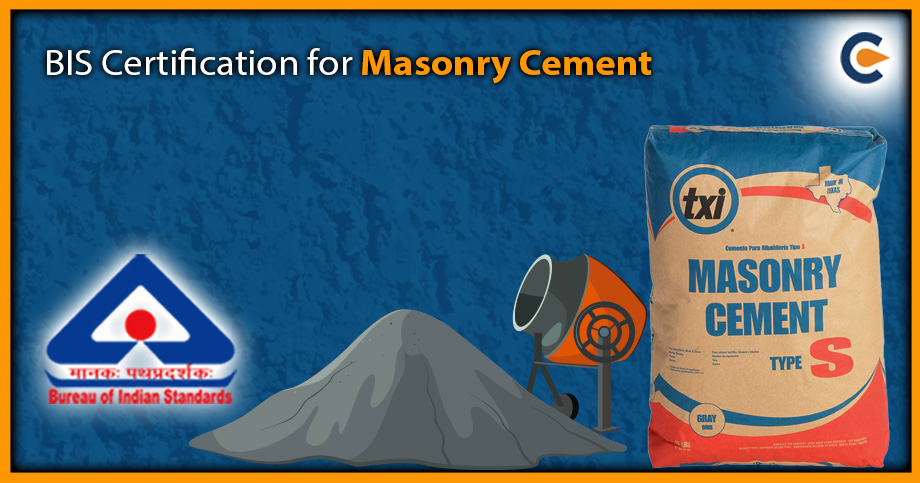Masonry cement refers to a type of cement that is subjected to a blending process to produce a binding mortar when mixed with water and sand in apt proportions. This cement is widely used for blockwork, bricklaying, and plastering. The masonry cement boosts the bond strength, workability, and durability of the mortar. It also prevents water from seeping in, making it highly suitable for areas where moisture prevails. Overall, masonry cement serves as a demanding material for projects requiring reliable and strong mortar. Those who are planning to engage in the production of masonry cement must secure the BIS certification beforehand. This blog will make you understand how to secure BIS certification for Masonry cement in a hassle-free manner.
Underlining the Importance Of IS 3466:1988 in BIS Certification for Masonry Cement
IS3466:1988 is all about masonry cement and pens down the manufacturing process, chemical, and physical norms for its use where masonry mortars are required.
Masonry cement is manufactured by blending cement clinker with either pozzolanic or non-pozzolanic & waste materials. Air-entraining plasticizers and gypsum are also required in apt proportions. The fineness of this cement is higher than that of Ordinary Portland cement.
As per the standard, the masonry cement must adhere to the physical norms cited therein when subjected to prescribed tests. It is the onus of the cement producer to follow the standard’s norms. Also, the manufacturer should take good care of the in-house lab where standard tests are carried out.
Tests to Qualify For BIS Certification for Masonry Cement
The specified sample of masonry cement shall be subjected to the following tests to determine its quality. These tests will serve as a basis for a BIS certification.
- Fineness test
- Air content test
- Setting time test
- Soundness test
- Water retention test
- Staining test
- Compressive strength test
What Labelling Norms Do Manufacturers Need To Follow?
IS3466:1988 also entails labelling and marking norms concerning masonry cement. The standard specifies how marking and labelling should be carried out before dispatching the product to the buyer.
Each bag or drum containing masonry cement should bear the ISI marking. This condition doesn’t apply to the product that fails to meet the underlying specifications.
The use of ISI marking depends on whether or not the manufacturer has BIS[1] approval in the form of certification. This BIS accords the ISI certification after inspecting the application, documents, and production premise. The BIS uses its own checklist of compliance formulated in view of IS3466:1988 while performing the inspection.
Documents Concerning BIS Certification for Masonry Cement
Common paperwork required for BIS certification for Masonry cement includes:
- Application form
- Test reports accorded by the BIS-recognized labs
- Trademark registration (if applicable)
- ISO/IEC 17025 certificate or equivalent
- Quality control manual
- List of machinery as well as equipment
- Manufacturing unit layout plan
- Appointment letter for non-Indian manufacturers
- Undertaking to assuring adherence to the BIS norms
- Proof of payment of fees
Note: The documents cited here are generalized in nature, and thus, the paperwork required for BIS certification can vary depending on the product in question.
How to Secure BIS Certification for Masonry Cement?
Obtaining BIS certification for Masonry cement can be a bit overwhelming for new companies. From paperwork arrangement to compliance drill down, one might find it difficult to handle legalities around this license. Let’s take a brief walkthrough of the procedure concerning BIS Certification for Masonry Cement:
- Step 1: Arrange Mandatory Paperwork
Paperwork plays a vital role in almost every licensing process and BIS registration is no different. BIS registration requires various paperwork such as testing reports, QMS certificates, business registration, and so on.
Applicants must double-check these documents for accuracy before furnishing them to the authority. Any misleading information or detail in the paperwork can lead to the applicant’s cancellation.
- Step 2: Apply for Product Testing
This step involves the prescribed testing of the product sample(s) to determine the quality. The applicant is required to visit the certified lab along with the product sample(s) and apply for testing. In response, the lab will collect the sample(s) to perform the following tests in view of the governing standard.
- Fineness test
- Air content test
- Setting time test
- Soundness test
- Water retention test
- Staining test
- Compressive strength test
- Step 3: File BIS Approval Application
Once the lab certifies the product for quality and intended performance, proceed with the next step, which is application filing. To do so, visit the BIS web portal, locate the ISI certification scheme, and file a prescribed e-form.
This web-based application will prompt you to fill out information about the production facility, standards being used, and testing facility. Make sure the information that you filed is as accurate as possible to avert any rejection chances.
- Step 4: Inspection
Once the application finds its way to the relevant department, the vetting process shall come into effect. The inspection will be performed by the designated BIS officials who will try to identify any possible non-conformity.
Any concern flagged by the officials during the inspection shall be shared with the applicant. The applicant shall get ample time to resolve the issue to avert any processing delay.
- Step 5: Grant of Certification
If the authority finds the applicant’s response satisfactory, the grant of certification will come into effect. After securing BIS certification for Masonry cement, the applicant can start affixing the ISI marking on their product.
Conclusion
In conclusion, BIS certification is a must-have legal document for cement producers. Depsite being a legal compulsion, BIS registration helps companies garner trust and must-needed credibility among the target consumers. Companies that use the ISI logo on their products can experience increased and consistent sales no matter how stiff the competition is.
Read Our Article: An Overview Of BIS ISI Mark For Cement Manufacturers













